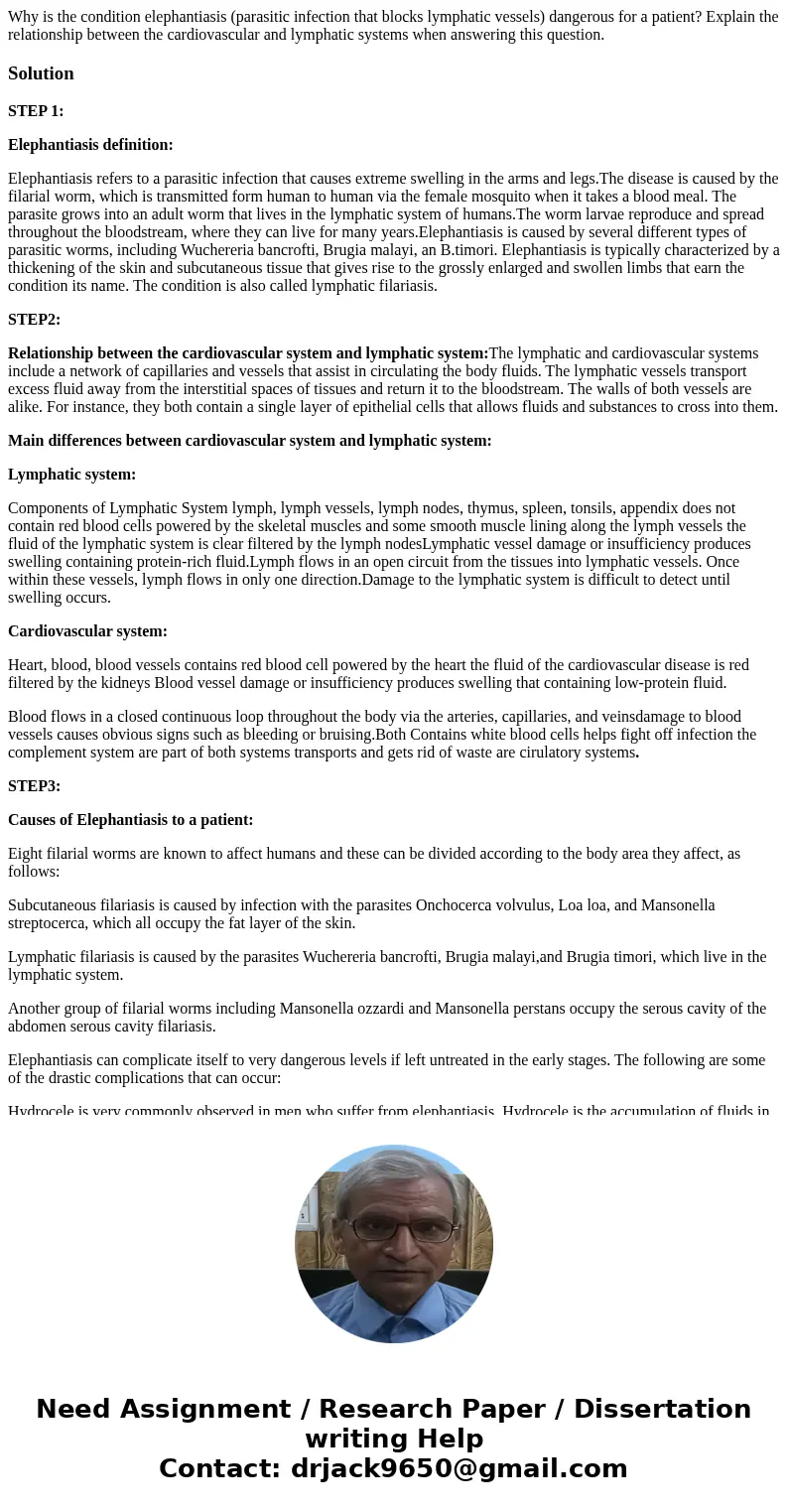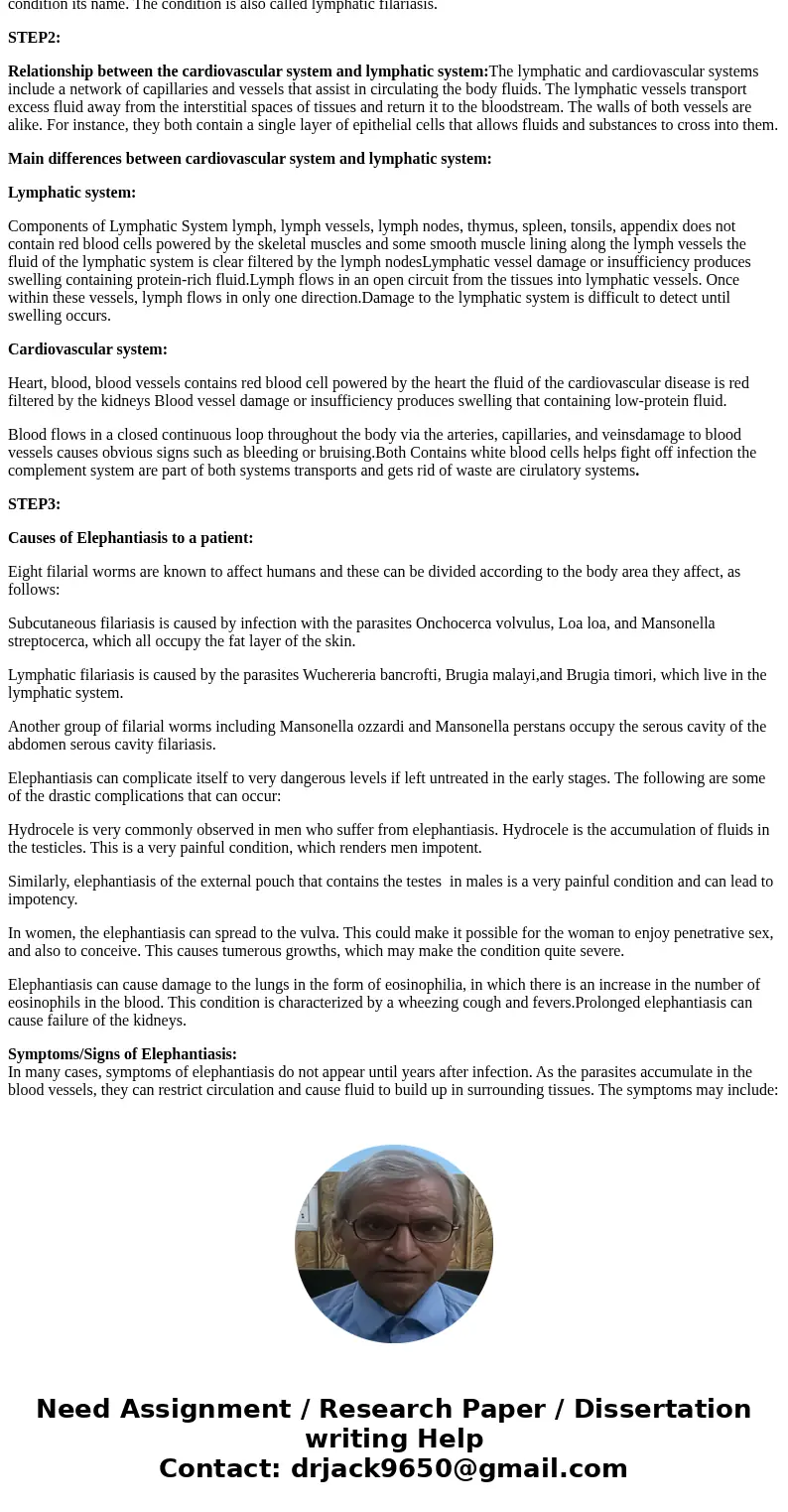Why is the condition elephantiasis parasitic infection that
Why is the condition elephantiasis (parasitic infection that blocks lymphatic vessels) dangerous for a patient? Explain the relationship between the cardiovascular and lymphatic systems when answering this question.
Solution
STEP 1:
Elephantiasis definition:
Elephantiasis refers to a parasitic infection that causes extreme swelling in the arms and legs.The disease is caused by the filarial worm, which is transmitted form human to human via the female mosquito when it takes a blood meal. The parasite grows into an adult worm that lives in the lymphatic system of humans.The worm larvae reproduce and spread throughout the bloodstream, where they can live for many years.Elephantiasis is caused by several different types of parasitic worms, including Wuchereria bancrofti, Brugia malayi, an B.timori. Elephantiasis is typically characterized by a thickening of the skin and subcutaneous tissue that gives rise to the grossly enlarged and swollen limbs that earn the condition its name. The condition is also called lymphatic filariasis.
STEP2:
Relationship between the cardiovascular system and lymphatic system:The lymphatic and cardiovascular systems include a network of capillaries and vessels that assist in circulating the body fluids. The lymphatic vessels transport excess fluid away from the interstitial spaces of tissues and return it to the bloodstream. The walls of both vessels are alike. For instance, they both contain a single layer of epithelial cells that allows fluids and substances to cross into them.
Main differences between cardiovascular system and lymphatic system:
Lymphatic system:
Components of Lymphatic System lymph, lymph vessels, lymph nodes, thymus, spleen, tonsils, appendix does not contain red blood cells powered by the skeletal muscles and some smooth muscle lining along the lymph vessels the fluid of the lymphatic system is clear filtered by the lymph nodesLymphatic vessel damage or insufficiency produces swelling containing protein-rich fluid.Lymph flows in an open circuit from the tissues into lymphatic vessels. Once within these vessels, lymph flows in only one direction.Damage to the lymphatic system is difficult to detect until swelling occurs.
Cardiovascular system:
Heart, blood, blood vessels contains red blood cell powered by the heart the fluid of the cardiovascular disease is red filtered by the kidneys Blood vessel damage or insufficiency produces swelling that containing low-protein fluid.
Blood flows in a closed continuous loop throughout the body via the arteries, capillaries, and veinsdamage to blood vessels causes obvious signs such as bleeding or bruising.Both Contains white blood cells helps fight off infection the complement system are part of both systems transports and gets rid of waste are cirulatory systems.
STEP3:
Causes of Elephantiasis to a patient:
Eight filarial worms are known to affect humans and these can be divided according to the body area they affect, as follows:
Subcutaneous filariasis is caused by infection with the parasites Onchocerca volvulus, Loa loa, and Mansonella streptocerca, which all occupy the fat layer of the skin.
Lymphatic filariasis is caused by the parasites Wuchereria bancrofti, Brugia malayi,and Brugia timori, which live in the lymphatic system.
Another group of filarial worms including Mansonella ozzardi and Mansonella perstans occupy the serous cavity of the abdomen serous cavity filariasis.
Elephantiasis can complicate itself to very dangerous levels if left untreated in the early stages. The following are some of the drastic complications that can occur:
Hydrocele is very commonly observed in men who suffer from elephantiasis. Hydrocele is the accumulation of fluids in the testicles. This is a very painful condition, which renders men impotent.
Similarly, elephantiasis of the external pouch that contains the testes in males is a very painful condition and can lead to impotency.
In women, the elephantiasis can spread to the vulva. This could make it possible for the woman to enjoy penetrative sex, and also to conceive. This causes tumerous growths, which may make the condition quite severe.
Elephantiasis can cause damage to the lungs in the form of eosinophilia, in which there is an increase in the number of eosinophils in the blood. This condition is characterized by a wheezing cough and fevers.Prolonged elephantiasis can cause failure of the kidneys.
Symptoms/Signs of Elephantiasis:
In many cases, symptoms of elephantiasis do not appear until years after infection. As the parasites accumulate in the blood vessels, they can restrict circulation and cause fluid to build up in surrounding tissues. The symptoms may include:


 Homework Sourse
Homework Sourse